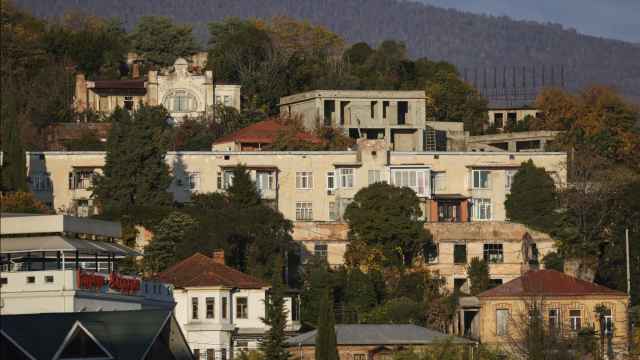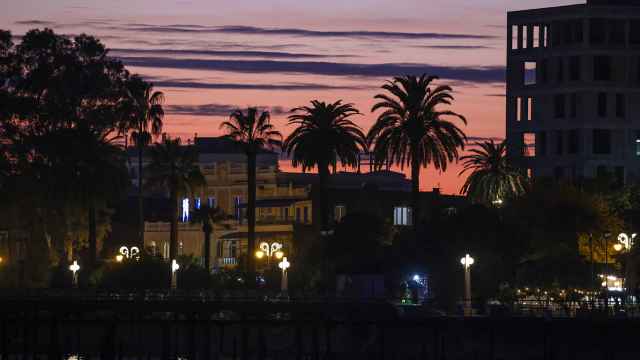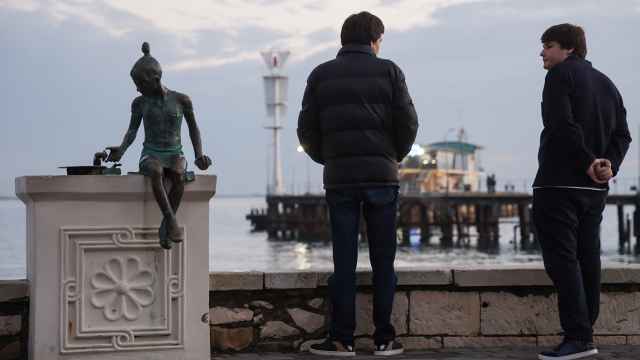Georgia’s breakaway region of Abkhazia was left without electricity Wednesday as critically low water levels triggered an emergency shutdown at its hydropower station and Russia allegedly withheld millions in financial aid.
The energy crisis comes days after Abkhazia’s leader resigned and lawmakers scrapped a controversial Russian investment deal that sparked protests in the Black Sea region in November.
Abkhazia had been purchasing electricity from Russia since Nov. 1 due to an energy deficit caused by low water levels at the Enguri dam, which supplies the region’s largest hydroelectric facility. However, the volume of electricity imported from Russia fell short of covering the region’s needs, prompting authorities to impose daily 10-hour power cuts from Monday.
“Due to the critically low water level and its insufficient inflow, the emergency protection system was activated and the hydroelectric power station stopped,” the state-owned power company Chernomorenergo said Wednesday. “Currently, there is no electricity throughout the entire territory of the republic.”
Abkhazian authorities said Russia suspended its financial aid to the cash-strapped region on Dec. 5, including crucial funding for the energy sector.
Russia has not commented on Abkhazia’s claims that Moscow unilaterally withheld 1.8 billion rubles (approximately $18 million) in funding.
Media previously reported that Russia was now selling electricity to Abkhazia at market rates after the region failed to fulfill its commitments, which included ratifying the Russian investment deal.
Kremlin spokesman Dmitry Peskov said Tuesday that Moscow was “in regular talks” with its partners in Abkhazia over both the Russian aid and the scrapped Russian investment deal.
The so-called “apartments bill” would have lifted the region’s ban on foreign ownership of residential property, allowing Russians to purchase real estate on the Black Sea coast.
Abkhazia’s acting Prime Minister Valery Bganba previously admitted the possibility of introducing a state of emergency in its energy sector, while acting President Badra Gunba said there were “very serious difficulties in ensuring the country’s energy security.”
Russia has backed Abkhazia and Georgia’s other breakaway territory of South Ossetia since fighting a five-day war against Tbilisi in 2008.
Moscow in November advised its citizens not to travel to Abkhazia, a popular holiday destination for many Russians.
A Message from The Moscow Times:
Dear readers,
We are facing unprecedented challenges. Russia's Prosecutor General's Office has designated The Moscow Times as an "undesirable" organization, criminalizing our work and putting our staff at risk of prosecution. This follows our earlier unjust labeling as a "foreign agent."
These actions are direct attempts to silence independent journalism in Russia. The authorities claim our work "discredits the decisions of the Russian leadership." We see things differently: we strive to provide accurate, unbiased reporting on Russia.
We, the journalists of The Moscow Times, refuse to be silenced. But to continue our work, we need your help.
Your support, no matter how small, makes a world of difference. If you can, please support us monthly starting from just $2. It's quick to set up, and every contribution makes a significant impact.
By supporting The Moscow Times, you're defending open, independent journalism in the face of repression. Thank you for standing with us.
Remind me later.






